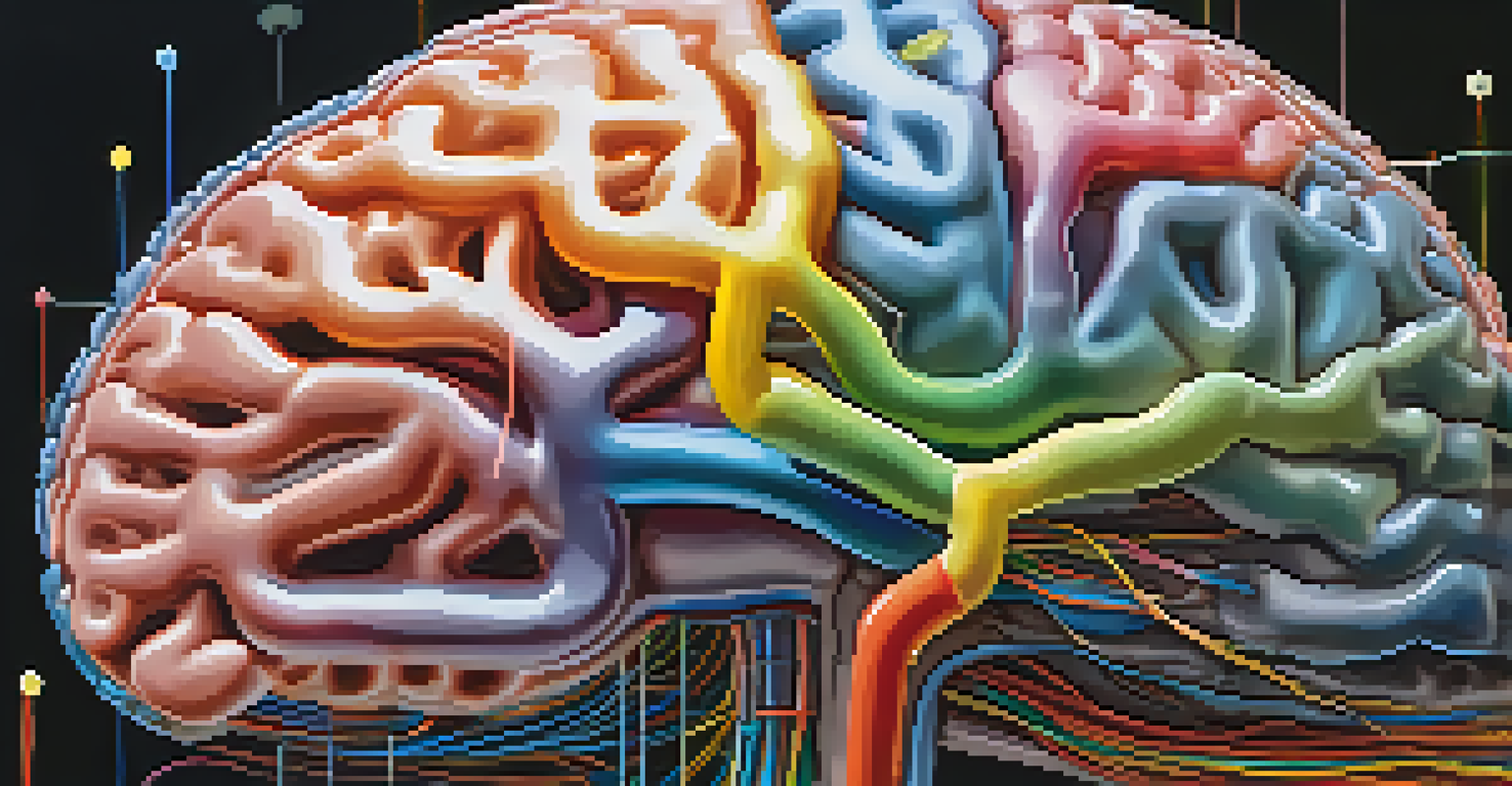The Brain's Reward System: Neurotransmitters and Motivation

What is the Brain's Reward System?
The brain's reward system is a complex network that plays a critical role in our motivation and pleasure. It helps us understand why certain behaviors are rewarding and how they drive our actions. This system primarily involves several key areas in the brain, including the nucleus accumbens and the ventral tegmental area, which work together to create feelings of enjoyment.
The greatest discovery of my generation is that a human being can alter his life by altering his attitudes.
When we engage in activities that are deemed rewarding, like eating our favorite food or achieving a goal, this system activates. It sends signals that make us feel good, encouraging us to repeat those behaviors. In a way, it's like a natural reward program that reinforces actions that are beneficial for our survival and well-being.
Understanding this system is crucial because it influences everything from our daily habits to our long-term goals. By exploring how this network functions, we can better grasp the underlying motivations that drive human behavior.
The Role of Neurotransmitters in Motivation
Neurotransmitters are chemical messengers that transmit signals in the brain, and they play a pivotal role in the brain's reward system. The most well-known neurotransmitter related to motivation is dopamine, often referred to as the 'feel-good' hormone. When dopamine is released, it creates a sense of pleasure, reinforcing the desire to pursue activities that lead to its release.

In addition to dopamine, other neurotransmitters like serotonin and endorphins also contribute to our feelings of reward and motivation. For example, serotonin helps regulate mood and can enhance motivation when we feel positive. Endorphins, on the other hand, are released during physical activities, like exercise, providing a natural high that keeps us wanting more.
Brain's Reward System Drives Actions
The brain's reward system motivates our behaviors by associating actions with feelings of pleasure.
By understanding how these neurotransmitters work together, we can begin to see how they shape our motivations daily. Whether it's the thrill of a new challenge or the joy of social interactions, these chemicals are constantly influencing our choices.
How Motivation Affects Behavior
Motivation is the driving force behind our actions, and it profoundly affects our behavior. When we are motivated, we are more likely to pursue goals, take risks, and engage in new experiences. This motivation can stem from various sources, including internal desires, external rewards, or social influences.
Motivation is what gets you started. Habit is what keeps you going.
For instance, think about the motivation to complete a project at work. If you know there's a reward, like a promotion or recognition, you're more likely to put in the effort. Conversely, if the task feels meaningless or lacks incentives, your motivation may dwindle, leading to procrastination or disengagement.
Recognizing the factors that influence our motivation can help us harness it effectively. By setting clear goals and understanding what drives us, we can align our actions with our aspirations, leading to a more fulfilling life.
The Impact of Rewards on Motivation
Rewards play a significant role in shaping our motivation. They can be tangible, like money or gifts, or intangible, like praise or a sense of accomplishment. The anticipation of a reward can boost motivation, making us more likely to engage in behaviors that are aligned with achieving that reward.
However, it's essential to strike a balance between intrinsic and extrinsic rewards. While external rewards can be motivating, relying solely on them can diminish intrinsic motivation—our internal drive to do something for its own sake. For example, if someone starts painting solely for money, they may lose the joy and creativity that initially inspired them.
Neurotransmitters Shape Motivation
Chemicals like dopamine and serotonin play crucial roles in influencing our motivation and enjoyment.
Thus, understanding how different types of rewards affect our motivation helps us create a more effective approach to achieving our goals. By incorporating both intrinsic and extrinsic rewards, we can maintain our passion while still striving for tangible outcomes.
How Habits Are Formed Through Reward
Habits are often formed through the reinforcement of behaviors that lead to rewards. When we consistently engage in a behavior that results in a positive outcome, our brain starts to associate that behavior with the reward, creating a habit. This process is part of what makes the brain's reward system so powerful.
Take, for example, the habit of exercising. If you feel energized and happy after a workout, your brain recognizes that reward and encourages you to make it a routine. Over time, the repetition of this behavior solidifies it into a habit, making it easier to stick with it.
Understanding this mechanism can aid us in breaking bad habits or establishing new ones. By focusing on the rewards we can achieve, we can create a positive feedback loop that reinforces desirable behaviors.
The Effects of Stress on the Reward System
Stress can have a significant impact on the brain's reward system, often dampening motivation and altering our behaviors. When we experience high levels of stress, our body releases cortisol, which can interfere with the function of neurotransmitters like dopamine. As a result, activities that once felt rewarding may become less enjoyable or even unmotivating.
For instance, someone who usually finds joy in socializing might withdraw when overwhelmed by stress. This can create a cycle where the lack of motivation leads to isolation, which in turn increases stress levels. Understanding this connection is key to addressing mental health and well-being.
Stress Can Diminish Motivation
High stress levels can interfere with the brain's reward system, leading to decreased motivation and enjoyment in activities.
By implementing stress-reducing strategies such as mindfulness, exercise, or seeking support, we can help restore balance to our reward system. This can rekindle motivation and encourage healthier behaviors, allowing us to navigate life's challenges more effectively.
The Future of Research on Motivation and the Brain
The study of the brain's reward system and motivation is an evolving field that holds promise for future research and applications. Scientists are continually uncovering new insights into how neurotransmitters affect our behaviors and decision-making processes. This research could lead to innovative approaches for addressing mental health disorders, addiction, and motivational deficits.
For example, understanding the neurobiological underpinnings of motivation could help develop targeted therapies for conditions like depression, where motivation is often severely impacted. Additionally, researchers are exploring how technology can assist in enhancing motivation, such as through gamification in educational settings.

As we learn more about the brain's complexities, we can harness this knowledge to improve our well-being and optimize our potential. The future looks bright for the intersection of neuroscience and motivation, paving the way for transformative change.